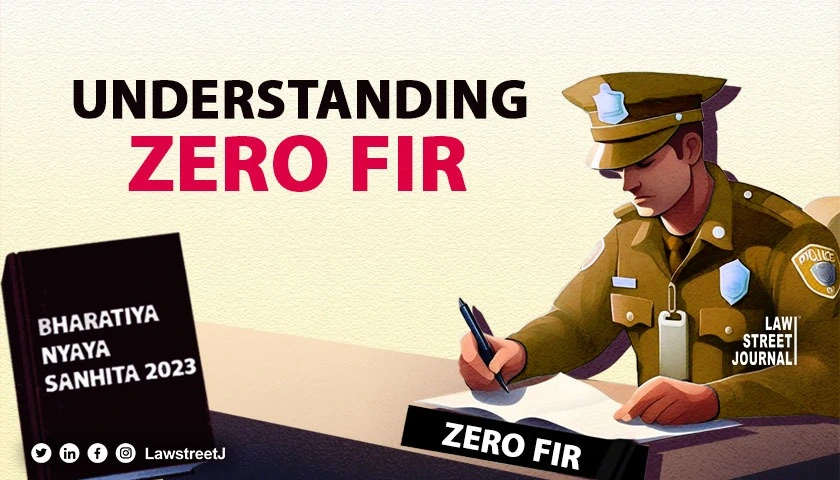New Delhi: Police not filing FIRs (First Information Reports) has been a legal anomaly persisting for decades. According to Section 154 of the CrPC, any cognizable complaint reported to the police should be documented in writing and an FIR registered. However, this is not the ground reality, as we all know. This new law might bring some change in Bharat’s criminal justice system!
In a conversation with LawStreet Journal, Advocate Nitesh Mehra extensively discusses the provisions of Zero FIR and E-FIR.
Zero FIR, the registration of police complaints online, summons through electronic modes, and mandatory videography of crime scenes for all heinous crimes are some of the key highlights of the three new criminal laws that came into effect on Monday, July 1. The Bharatiya Nyaya Sanhita 2023, Bharatiya Nagarik Suraksha Sanhita 2023, and Bharatiya Sakshya Adhiniyam 2023, enacted late last year, have replaced the British-era Indian Penal Code, Code of Criminal Procedure, and the Indian Evidence Act, respectively.
What is Zero FIR?
With the introduction of Zero FIR, a person can file a First Information Report (FIR) at any police station, regardless of jurisdiction. This eliminates delays in initiating legal proceedings and ensures the immediate reporting of the offense.
When to File a Zero FIR?
Zero FIR can be filed for any criminal offense, ranging from theft, assault, kidnapping, harassment, and sexual offenses, to more serious crimes like murder and terrorism.
Purpose of Zero FIR
The primary objective of Zero FIR is to ensure the timely and efficient reporting and investigation of crimes, especially when the victim is away from the incident’s jurisdiction or during emergencies. Once transferred, the jurisdictional police station will number the FIR and start the investigation.
Background of Zero FIR
The concept of Zero FIR is not new. According to Advocate Nitesh Mehra, the infamous Nirbhaya gang rape case in Delhi in 2012 brought the concept of Zero FIR into the limelight. The victim’s friend immediately reported the incident to the police, who registered a Zero FIR. The case was later transferred to the appropriate police station for further investigation.
It was also recommended by the Ministry of Home Affairs in 2015 for crimes against women. The courts have supported the registration of Zero FIR in several cases, emphasizing the duty to record information about cognizable offenses and forward it to the appropriate police station. Now, BNSS makes it a legal provision to allow Zero FIR.
Also Read: First FIR under new laws filed in Delhi
Now, let’s talk about E-FIR
Section 173 of BNSS allows for the registration of FIRs electronically. Here’s a brief overview of how e-FIR works: Advocate Nitesh Mehra explained that a complainant can submit a complaint electronically through the official police e-FIR portal, police website, or any electronic communication. This includes providing personal details, incident specifics, and supporting documents.
After this, the submitted e-FIR will be forwarded to the investigating officer for initial verification. If the offense is punishable with imprisonment for three to seven years, a preliminary inquiry may be conducted within 14 days with permission from a higher-ranking officer. If the complaint is sent electronically, it must be signed by the complainant within three days for it to be officially registered as an FIR. This ensures timely action by the police. A free copy of the FIR must be provided to the informant or victim immediately after it’s recorded, as per BNSS Section 173(2). After that, the Station House Officer (SHO) reviews the FIR and assigns it to an investigating officer, who then conducts the investigation following standard procedures.
What change will Zero FIR and e-FIR bring to lawyers’ roles?
E-FIR and Zero FIR can make the process of filing complaints and initiating legal action quicker and more efficient. Lawyers may find it easier to access FIRs electronically, reducing administrative hurdles. Advocate Nitesh Mehra emphasized that Zero FIR ensures that lawyers can initiate legal proceedings immediately without concerns about jurisdictional boundaries, which can help deliver justice in cases involving crimes committed across different areas. With e-FIRs, the documentation of complaints and access to initial evidence may become more standardized and digital. Lawyers might need to adapt to handling electronic evidence more effectively. E-FIR and Zero FIR aim to enhance the efficiency and accessibility of the legal process in India. For lawyers, these changes mean potentially faster access to information and smoother initiation of legal proceedings.
Previously, the law did not mandate the registration of Zero FIRs or the recording of e-FIRs. As a result, lawyers often had to resort to applying under Section 156(3) of the Criminal Procedure Code (CrPC) when the police refused to register FIRs. With the enactment of Section 173(1) of the BNSS, which mandates FIR registration and investigation, lawyers may experience a significant impact on their workload. However, the doors are never closed. In case the police do not register the FIR and misuse their powers during the fourteen days of preliminary inquiry for offenses punishable by three to seven years of imprisonment, lawyers have the right to take the grievances of the victim to the court under Section 175(3) of BNSS.













